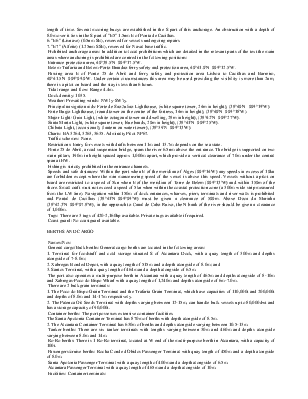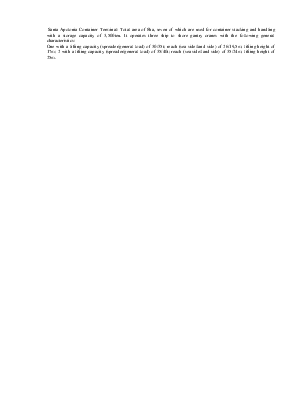


PORT DESCRIPTION
Location: The port of Lisbon is situated at the estuary of the River Tagus, which is 25km long and between 2km and 14km wide.
General overview: The port of Lisbon covers over 32,500ha with over 16,000m of berthage. The berths on the North Bank have a length of 13,000m with depths alongside varying between 4.0m and 13m. The berths on the South Bank have a length of 3,000m with a depth alongside varying between 3.0m and 17m.
All cruise ship handling and a large proportion of total cargo handling, including general cargo and containers, is on the North Bank, while the South Bank has specialised dry and liquid bulk terminals.
Traffic figures: Approx 13,669,000t of cargo and 115,894 cruise passengers are handled annually.
Load Line zone: Summer.
Max size: Vessels up to 1,000,000dwt can be accommodated.
Security draft: For the port, this is 10.5m. For drafts greater than this, entrance is subject to tide, weather and visibility conditions.
NAVIGATION
Port limits: The port limits are bounded at the river entrance by a line leading SE from Forte de Sao Juliao (38°40'N 009°19'W) to Forte Bugio (1.5nm SE) (a line traditionally known as Linha de Entre-Torres), then E to Ponta da Calha (38°40'N 009°16'W). Upriver the limits are bounded by the bridge which crosses Rio Tejo at the town of Vila Franca de Xira (38°57'N 008°59'W).
Sea buoys, fairways and channels: The port is approached by two channels defined by leading marks. Barra Norte, the shallower, is entered from W and Barra Sul the deeper channel, also known as Barra Grande, which is maintained by dredging, is entered from SW. Both channels merge at the entrance to the river which is 1.5nm wide between Forte de Sao Juliao and Forte Bugio.
The ports main access channel has a depth of 14.5m LST.
Pilot: Pilotage is compulsory in the port of Lisbon and in the whole of the navigable area of the Tagus River up to a limit of 6nm as from S Juliao Lighthouse. The pilots will be boarded and landed at a point 1.3nm SE of Santa Marta Lighthouse (38°40.5'N 009°23.9'W), in Cascais Bay, from/to a pilot launch with blue hull and white superstructure.
A min of 2 hours notice of ETA at the Cascais or Belem Pilot Stations is required. If the pilot station is not specified by the arriving vessel the destination is assumed to be Cascais.
Vessels bound for Lisbon harbour should communicate their ETA at the boarding station, directly from the ship, to the Lisbon pilots. At least 2 hours notice for ETD should be communicated to the Lisbon pilots.
Lisbon pilots may be contacted by Tel: +351 1301 3111, by Fax: +351 1 301 6411 or by VHF, callsign "Lisbon Pilots" on VHF Ch 14 (calling and working channel).
Anchorages: Outer anchorages: There are two designated anchorage areas in Baia de Cascais (38°41'N 009°24'W) which are utilised by vessels awaiting entry to Rio Tejo:
Vessels drawing more than 5.0m in an area, situated 1.5nm SE of Sant Marta Lighthouse (38°41'N 009°25'W).
Vessels drawing less than 5.0m anchor in an area, situated 1.5nm E of Santa Marta Lighthouse.
For anchoring purposes the port is divided into two zones, E and W, with the boundary between them being the line joining Torre de Belem pilot station with the old Lazareto basin (1nm S). These zones are further divided into designated areas, details of which are given below. In general the bottom is sand and mud and the holding ground is good, however the tidal streams are strong and W winds on the out going stream cause vessels to range considerably with the possibility of dragging. Large vessels are not so likely to drag if anchored near the S shore, E winds cause the most sea in the port:
W Zone: The four designated areas, are as follows (positioned from Torre de Belem);
1. "W1" (Praia de Caxias) (2.24nm W).
2. "W2N" (Sao Jose Norte) (1.25nm W).
Caution: A sewer outfall extends 0.37nm S from the shore on the boundary between the above two anchorages.
3. "W2S" (Sao Jose Sul) (1.5nm WSW).
4. "W3" (Pedroucos) (0.6nm SW), includes 3 numbered berths in depths of 34m reserved for vessels, including tankers, over 120m in length.
E Zone: The seven designated areas, are as follows (positioned from Pontal de Cacilhas) (38°41'N 009°09'W):
1. "E1" (2nm W), includes 3 numbered berths in depths of 25m to 29m reserved for vessels, including tankers, over 120m in length. Smaller vessels, up to 2,000dwt and which are not carrying dangerous cargo, may anchor 0.2nm offshore in the N part of this anchorage.
2. "E2" (0.75nm W), short stay anchorage whilst awaiting a berth or port officials to board for clearance, etc.
3. "E3" (1.5nm NNE), warship anchorage.
4. "E4" (2.25nm NE), includes 4 numbered berths in depths of 8.0m to 16.5m reserved for vessels, including tankers over 120m in length.
5. "E5" (Mar da Palha) (1.75nm E,; dangerous cargo anchorage; includes 7 numbered berths reserved for vessels, including tankers over 120m in length. Extending NE from E5 into Cala de Samora there are two areas where vessels may, after inspection by the Port Authorities and subject to certain conditions, be permitted to lay up for an agreed length of time. Several mooring buoys are established in the S part of this anchorage. An obstruction with a depth of 8.0m over it lies in the S part of "E5" 1.5nm E of Ponta de Cacilhas.
Уважаемый посетитель!
Чтобы распечатать файл, скачайте его (в формате Word).
Ссылка на скачивание - внизу страницы.